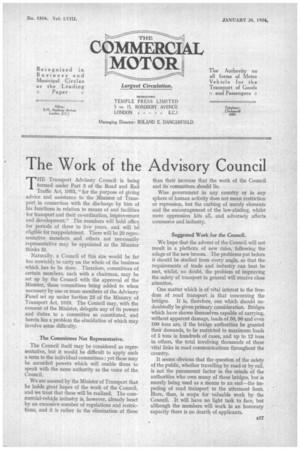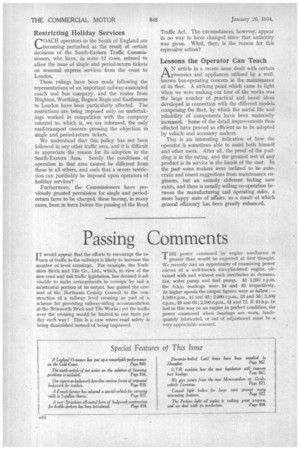The Work of the Advisory Council
Page 27

Page 28

If you've noticed an error in this article please click here to report it so we can fix it.
THE Transport Advisory Council is being formed under Part 3 of the Road and Rail Traffic Act, 1933, "for the purpose of giving advice and assistance to the Minister of Transport in connection with the discharge by him of his functions in relation to means of and facilities for transport and their co-ordination, improvement and development." The members will hold office for periods of three to five years, and will be eligible for reappointment. There will be 29 representative members and others not necessarily representative may be appointed as the Minister thinks fit.
Naturally, a Council of this size would be far too unwieldy to carry on the whole of the business which. has to be done. Therefore, committees of certain members, each with a chairman, may be set up by the Council with the approval of the Minister, these committees being added to when necessary by one or more members of the Advisory Panel set up under Section 23 of the Ministry of Transport Act, 1919. The Council may, with the consent of the Minister, delegate any of its powers and duties to a committee so constituted, and herein lies a problem the elucidation of which may involve some difficulty.
The Committees Not Representative.
The Council itself may be considered as representative, but it would be difficult to apply such a term to the individual committees ; yet these may be accorded powers which will enable them to speak with the same authority as the voice of the Council.
We are assured by the Minister of Transport that be holds great hopes of the work of the Council, and we trust that these will be realized. The commercial-vehicle industry is, however, already beset by an excessive number of regulations and restrictions, and it is rather in the elimination of these than their increase that the work of the Council and its' committees should lie.
Wise government in any country or in any sphere of human activity does not mean restriction or repression, but the curbing of unruly elements and the encouragement of the law-abiding, whilst mere oppression hits all, and adversely affects commerce and industry.
Suggested Work for the Council.
We hope that the advent of the Council will not result in a plethora of new rules, following the adage of the new broom. The problems put before it should be studied from every angle, so that the requirements of trade and industry can best be met, whilst, no doubt, the problem of improving the safety of transport in general will receive close attention.
One matter which is of vital interest to the freedom of road transport is that concerning the bridges. It is, therefore, one which should undoubtedly be given primary consideration. Bridges which have shown themselves capable of carrying, without apparent damage, loads of 50, 80 and even 100 tons are, if the bridge authorities be granted their demands, to be restricted to maximum loads of 5 tons in hundreds of cases, and up to 12 tons in others, the total involving thousands of these vital links in road communications throughout the country.
It seems obvious that the question of the safety of the public, whether travelling by road or by rail, is not the paramount factor in the minds of the authorities who own many of these bridges, but is merely being used as a means to an end—the impeding of road transport to the uttermost limit. Here, then, is scope for valuable work by the Council. It will have no light task to face, but although the members will work in an honorary capacity there is no dearth of applicants.
Restricting Holiday Services
COACH operators in the South of England are k,...becoming perturbed as the result of certain decisions of the South-Eastern Traffic Commissioners, who have, in some 12 cases, refused to allow the issue of single and period-return tickets on seasonal express services from the coast to London.
These rulings have been made following the representations of an important railway-associated coach and bus company, and the routes from Brighton, Worthing, Bognor Regis and Eastbourne to London have been particularly affected. The restrictions are being imposed only on undertakings worked in competition with the company referred to, which is, we are informed, the only road-transport concern pressing the objection to single and period-return tickets.
We understand that this policy has not been followed in any other traffic area, and it is difficult to appreciate the reason for its adoption in the South-Eastern Area. Surely the conditions of operation in that area cannot be different from those in all others, and such that a severe restriction can justifiably be imposed upon operators of holiday services?
Furthermore, the Commissioners have previously granted permission for single and periodreturn fares to be charged, these having, in many cases, been in force before the passing of the Road Traffic Act, The circumstances, however, appear in no way to have changed since that authority was given. What, then, is the reason for this repressive action?
Lessons the Operator Can Teach
AN article in a recent issue dealt with certain processes and appliances utilized by a wellknown bus-operating concern in the maintenance of its fleet. A striking point which came to light when we were making our tour of the works was the large number of practical and novel ideas developed in connection with the different models comprising the fleet, by which the useful life and reliability of components have been • materially increased. Some of the detail improvements thus effected have proved so efficient as to be adopted by vehicle and accessory makers.
This is an interesting indication of how the operator is sometimes able to assist both himself and other users. After all, the proof of the pudding is in the eating, and the greatest test of any product is its service in the hands of the user. In the past some makers were inclined to be autocratic and resent suggestions from maintenance engineers, but an entirely different feeling now exists, and there is usually willing co-operation between the manufacturing and operating sides, a more happy state of affairs, as a result of which general efficiency has been greatly enhanced.




















































































